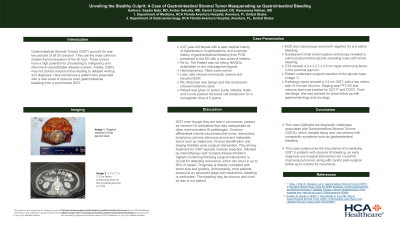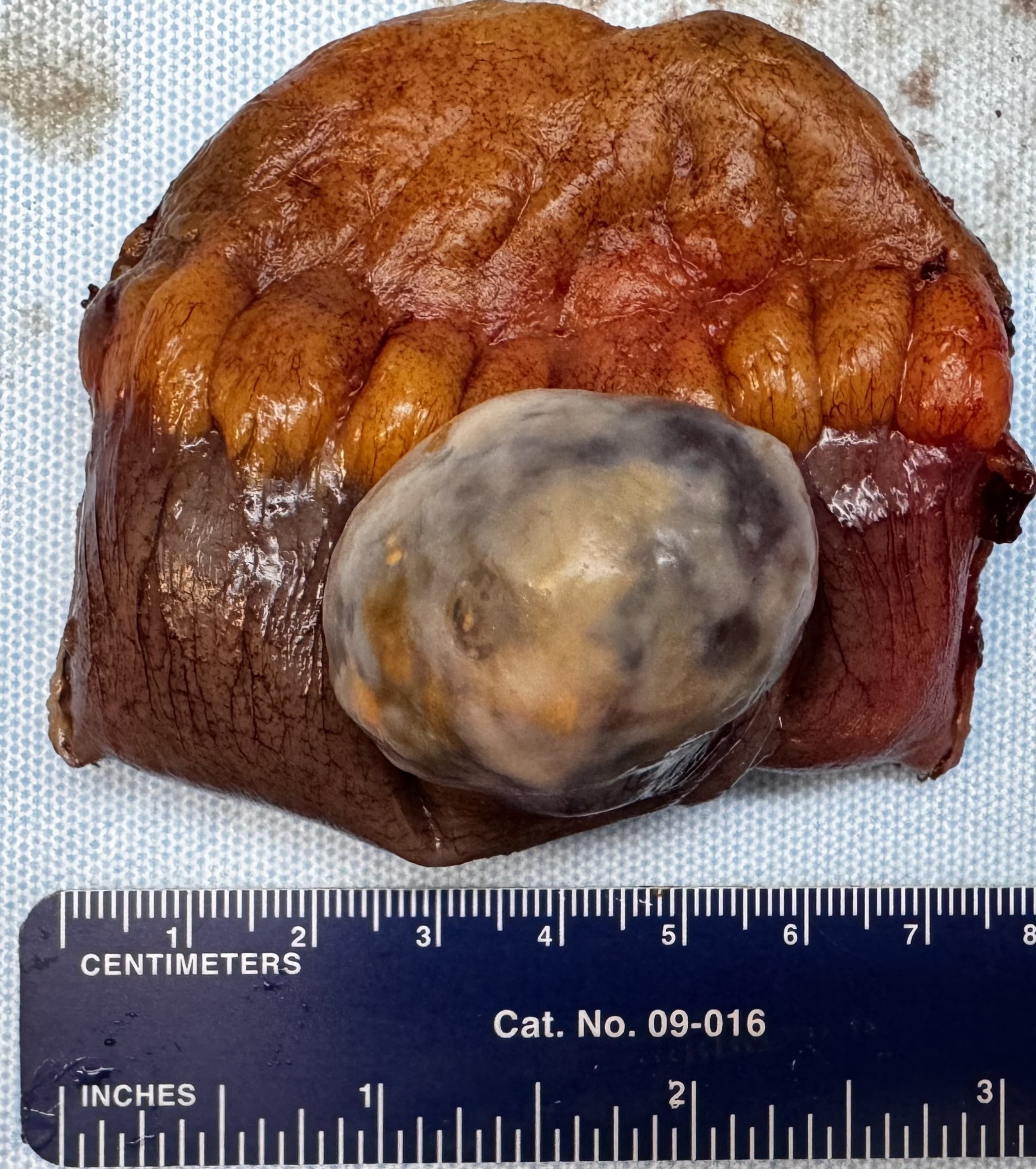Sunday Poster Session
Category: Small Intestine
P1580 - Unveiling the Stealthy Culprit: A Case of Gastrointestinal Stromal Tumor Masquerading as Gastrointestinal Bleeding
Sunday, October 27, 2024
3:30 PM - 7:00 PM ET
Location: Exhibit Hall E

Has Audio

Saadia Nabi, MD
Aventura Hospital
Aventura, FL
Presenting Author(s)
Saadia Nabi, MD1, Ambar Sekulits, MD2, Daniel Campbell, DO3, Ramasamy Nathan, MD1
1Aventura Hospital, Aventura, FL; 2Aventura Hospital, Dania Beach, FL; 3HCA Florida Healthcare, Aventura, FL
Introduction: Gastrointestinal Stromal Tumors (GIST) account for one - two percent of all GI cancers. They are the most common mesenchymal neoplasm of the GI tract. These tumors have a high potential for proceeding to malignancy and often have unpredictable disease courses. Initially, GISTs may not prompt suspicion thus leading to delayed workup and diagnosis. Here we discuss a patient who presented with a new onset of obscure overt gastrointestinal bleeding from a small bowel GIST.
Case Description/Methods: A 67-year-old female with a past medical history of hypertension, hyperlipidemia, and a remote history of gastrointestinal bleeding from PUD presented to the ED with a new onset of melena. The Patient was not taking NSAIDs, antiplatelet or any anticoagulant agents. Vitals were normal, but labs showed normocytic anemia and elevated BUN. Abdomen was benign and the rectal exam showed melanotic stool. Patient was given IV protonix, fluids, and 3 units packed red blood cell transfusion for a hemoglobin drop of 6 grams. EGD and colonoscopy were both negative for any active bleeding. Subsequent small bowel capsule endoscopy revealed a submucosal proximal jejunal ulcerating mass with active bleeding. CTA showed a 2.4 x 2.7 x 2.3 cm hyperenhancing lesion in the proximal jejunum. Patient underwent surgical resection of the jejunal mass (image 1). Pathology report showed a 3.2 cm GIST , with a low mitotic rate < 5 mm per 5sq mm. Staging was PT2 NX and immune stain was positive for CD117 and DOG1. Post-discharge, she was advised for close follow-up with gastroenterology and oncology.
Discussion: GIST even though they are rare in occurrence, present as common GI complaints that may masquerade as other more prevalent GI pathologies. Common differentials include neuroendocrine tumor, leiomyoma, lymphoma, primary adenocarcinoma and metastatic tumor such as melanoma. Prompt identification and staging facilitate early surgical intervention. The primary treatment for GIST typically involves resection, followed by chemotherapy with Tyrosine Kinase Inhibitors . Vigilant monitoring following surgical intervention is crucial for detecting recurrence, which can occur in up to 50% of cases1. Prognosis is directly correlated with tumor size and grading. Unfortunately, most patients present at an advanced stage with obstruction, bleeding or perforation. The bleeding may be obscure and overt as in our case

Disclosures:
Saadia Nabi, MD1, Ambar Sekulits, MD2, Daniel Campbell, DO3, Ramasamy Nathan, MD1. P1580 - Unveiling the Stealthy Culprit: A Case of Gastrointestinal Stromal Tumor Masquerading as Gastrointestinal Bleeding, ACG 2024 Annual Scientific Meeting Abstracts. Philadelphia, PA: American College of Gastroenterology.
1Aventura Hospital, Aventura, FL; 2Aventura Hospital, Dania Beach, FL; 3HCA Florida Healthcare, Aventura, FL
Introduction: Gastrointestinal Stromal Tumors (GIST) account for one - two percent of all GI cancers. They are the most common mesenchymal neoplasm of the GI tract. These tumors have a high potential for proceeding to malignancy and often have unpredictable disease courses. Initially, GISTs may not prompt suspicion thus leading to delayed workup and diagnosis. Here we discuss a patient who presented with a new onset of obscure overt gastrointestinal bleeding from a small bowel GIST.
Case Description/Methods: A 67-year-old female with a past medical history of hypertension, hyperlipidemia, and a remote history of gastrointestinal bleeding from PUD presented to the ED with a new onset of melena. The Patient was not taking NSAIDs, antiplatelet or any anticoagulant agents. Vitals were normal, but labs showed normocytic anemia and elevated BUN. Abdomen was benign and the rectal exam showed melanotic stool. Patient was given IV protonix, fluids, and 3 units packed red blood cell transfusion for a hemoglobin drop of 6 grams. EGD and colonoscopy were both negative for any active bleeding. Subsequent small bowel capsule endoscopy revealed a submucosal proximal jejunal ulcerating mass with active bleeding. CTA showed a 2.4 x 2.7 x 2.3 cm hyperenhancing lesion in the proximal jejunum. Patient underwent surgical resection of the jejunal mass (image 1). Pathology report showed a 3.2 cm GIST , with a low mitotic rate < 5 mm per 5sq mm. Staging was PT2 NX and immune stain was positive for CD117 and DOG1. Post-discharge, she was advised for close follow-up with gastroenterology and oncology.
Discussion: GIST even though they are rare in occurrence, present as common GI complaints that may masquerade as other more prevalent GI pathologies. Common differentials include neuroendocrine tumor, leiomyoma, lymphoma, primary adenocarcinoma and metastatic tumor such as melanoma. Prompt identification and staging facilitate early surgical intervention. The primary treatment for GIST typically involves resection, followed by chemotherapy with Tyrosine Kinase Inhibitors . Vigilant monitoring following surgical intervention is crucial for detecting recurrence, which can occur in up to 50% of cases1. Prognosis is directly correlated with tumor size and grading. Unfortunately, most patients present at an advanced stage with obstruction, bleeding or perforation. The bleeding may be obscure and overt as in our case

Figure: Jejunal Mass Surgical Resection
Disclosures:
Saadia Nabi indicated no relevant financial relationships.
Ambar Sekulits indicated no relevant financial relationships.
Daniel Campbell indicated no relevant financial relationships.
Ramasamy Nathan indicated no relevant financial relationships.
Saadia Nabi, MD1, Ambar Sekulits, MD2, Daniel Campbell, DO3, Ramasamy Nathan, MD1. P1580 - Unveiling the Stealthy Culprit: A Case of Gastrointestinal Stromal Tumor Masquerading as Gastrointestinal Bleeding, ACG 2024 Annual Scientific Meeting Abstracts. Philadelphia, PA: American College of Gastroenterology.
